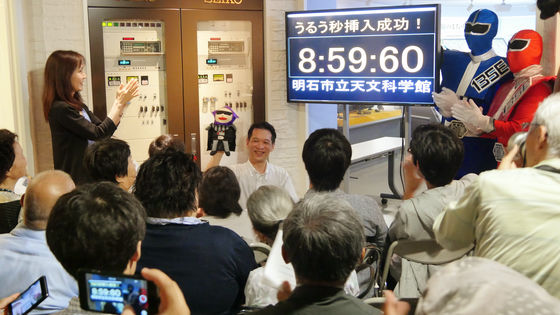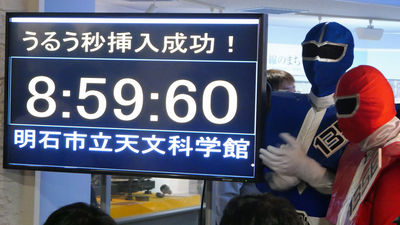It has been decided that 'leap seconds' will be abolished, and the insertion of leap seconds will be stopped by 2035

The length of time, such as ``1 day'' and ``1 second,'' which is the standard for human life, is determined based on the rotation of the Earth. However, as time measurement technology has progressed and it has become possible to accurately measure time using
The leap second's time is up: world votes to stop pausing clocks
https://www.nature.com/articles/d41586-022-03783-5
Do not adjust your clock: scientists call time on the leap second
https://www.theguardian.com/world/2022/nov/18/do-not-adjust-your-clock-scientists-call-time-on-the-leap-second
The ``leap second'' was introduced in 1972 to compensate for the difference between ``astronomical time'' and ``atomic time.'' has been added. GIGAZINE has covered the moment when a leap second is actually inserted, and you can find out what happens by reading the article below.
A local report that witnessed the exact moment when the leap second '8:59:60' was inserted at the Akashi City Astronomical Science Museum - GIGAZINE

Leap seconds have no effect on most people, and many people may not even notice that they have been inserted. However, some have proposed abolishing leap seconds because they can cause problems in systems that require accurate time, such as satellite navigation systems, software, and telecommunications systems.
Meta, the parent company of Facebook and Instagram, has also advocated for the elimination of leap seconds in the past.
Meta calls for the abolition of ``leap seconds'', in the past there have been large-scale failures in internet services - GIGAZINE

Meanwhile, the International Bureau of Weights and Measures (BIPM), which creates Coordinated Universal Time (UTC) by combining, analyzing, and averaging the atomic time standards of member countries around the world, is organizing the International Conference on Weights and Measures (BIPM), which is held every four years. CGPM) passed a resolution to abolish leap seconds, and it was passed to stop adding leap seconds by 2035.
Dr. Patrizia Tavera, head of the time department at BIPM, called the abolition of leap seconds a 'historic decision.' Furthermore, he stated that it would create a 'continuous flow of seconds that eliminates discontinuities caused by irregular leap seconds.' It added, 'The relationship between UTC and the Earth's rotation has not been lost. UTC remains relevant to the Earth,' adding, 'For the average person, nothing changes.'
Although it has been decided that leap seconds will be abolished, for the time being, leap seconds will continue to be added as needed. However, from around 2035, it will be acceptable for the difference between atomic time and astronomical time to be larger than 1 second. The CGPM proposes that even if UT1 and UTC are out of synchronization by about one minute, ``no leap seconds will be added for at least a century,'' but these details will be decided in the future in consultation with other international organizations. However, it is said that the ``upper limit of allowable error'' will be determined by 2026.
Although the breakdown of which countries agreed to abolish leap seconds has not yet been revealed, the British media The Guardian reports that the United States and France are the countries that led the way in abolishing leap seconds. It has also been revealed that Russia was one of the countries that voted against the bill, due to insufficient time to address technical issues with its satellite positioning system GLONASS . It seems that it is.

The UTC created by BIPM, which is made up of 59 member countries, is a 'global community effort,' and the U.S. National Institute of Standards and Technology says it is extremely important to maintain UTC even after the leap second is abolished. physicist Judah Rayban explains.
On the other hand, Rayban points out that GPS time , a rival to UTC that is managed by atomic clocks, is managed by the U.S. military with 'no global oversight.'
One possible solution to deal with the discrepancy between astronomical time and atomic time is to increase the time discrepancy to a maximum of 1 minute, or in other words, add 'leap minutes'. Although it is difficult to predict exactly how often this leap will be needed, Ray-Ban estimates that it will be necessary in about 50 to 100 years.
In addition, Felicitas Arias, former director of BIPM's time division, said, ``In most countries there is a one-hour difference between summer and winter time . This is much more than a leap second, but the impact '', pointing out that small time errors such as leap seconds and leap minutes do not affect many people's lives.
However, there is a possibility that the International Telecommunication Union (ITU) will interfere with the abolition of leap seconds by 2035.
Related Posts:
in Note, , Posted by logu_ii






